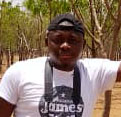The Democratic Republic of Congo (DRC) hosts over half of the species-rich Congo Basin forests – the second-largest contiguous tract of tropical forest in the world. Given the vital role DRC’s forests play in maintaining the equilibrium of the global ecosystem, curbing deforestation and degradation is a critical mission.
On 17 October 2023, the Center for International Forestry Research and World Agroforestry (CIFOR-ICRAF) and the University of Kinshasa (UNIKIN) held a science and policy dialogue on the DRC contingent of the UN’s climate mitigation programme Reducing Emissions from Deforestation and Forest Degradation (REDD+). The hybrid online and in-person session brought together academics, researchers, government officials, donors, civil society actors, young people, private sector representatives, and other stakeholders.
“The priority for DRC is to save and restore tropical forests to fight food insecurity and poverty,” said Junior Tshiteya, an activist on the climate economy and sustainable development. This presents some exciting opportunities. “The fight against climate change should not be charity or obligatory, but should be regarded as an opportunity for innovation, transformation, and change in the economic paradigm,” he said.
Tshiteya said that it is impossible to carry out any climate activity – be it sensitizing a community, educating young people, or running a nursery – without the requisite financial means. “As such, the first factor in all climate actions is wealth creation,” he said. “If you don’t create wealth, you don’t have the means to do anything.” He put forward a new economic paradigm centered on the transformation of local economies by reinforcing their capacities to reduce emissions, adapt, and be more resilient.
X-raying carbon tax
In a bid to reverse the rising speed of deforestation in DRC – which has consistently exceeded an annual rate of a million hectares since 2016 – and achieve net-zero carbon emissions by 2050, the country’s government has moved to institute a carbon tax – the first in the Congo Basin.
Claude Boyoo Itaka, a doctoral student and assistant at the Department of International Relations at the University of Kinshasa, said the yet-to-be-launched tax is timely but controversial, as it comes on the heels of an existing pollution tax. Civil society says it was not consulted, while the private sector fears double taxation, he said.
“The carbon tax is a measure which is justified in principle but raises some concerns in its application,” Boyoo Itaka said. “For instance, how will informal sector activities like subsistence farming, which accounted for 92.2 percent of deforestation between 2000 and 2014, be taxed?”
He said the move could be counterproductive in the long run, as a carbon tax on fossil fuels would inevitably increase the price of petroleum products, thereby pushing locals to double their dependence on other energy sources like trees. A way out of this conundrum, Boyoo suggested, is to target operational sectors with high ecological efficiency and low social sensitivity, and clarifying exemptions and pilot sectors before generalizing them.

Sharing benefits, following science
Presenting on REDD+ benefit-sharing, Félicien Kengoum, a doctoral researcher with the International Forest Policy Research Group at the University of Helsinki, said the notion is still under construction in DRC. He said that opportunity costs are currently ignored, while the focus is on operational costs at project level, and the risk of leakage in the definition of operational costs can be extended by project implementers to subtract part of the benefits.
CIFOR scientist Dr. Stibniati Atmadja said there was an increase in REDD+ official development assistance between 2020 and 2021, in DRC as well as globally. In DRC, out of the USD 139 million committed between 2010 and 2021, on average 71 percent was effectively disbursed. This disbursement rate is much lower among actors such as multilateral banks and government agencies. The Bezos Earth Fund is a major new donor in the country, rivaling traditional donors such as Norway.
“Private funding is starting to take a prominent role in DRC’s REDD+ landscape through official development assistance and the voluntary carbon market,” Atmadja said. She highlighted that two large projects in Equateur and Sankuru provinces, each spanning more than a million hectares, are in the pipeline to enter the voluntary carbon markets. The large sizes of these projects are cause of concern, as local civil society and local governments are not playing a decisive role in developing and shaping them.
Many speakers mentioned the need for concerted action between academia and policy makers for the benefit of DRC’s threatened forests and inhabitants. Prince Baraka, forest and climate programme officer at the Embassy of Norway in DRC, and representative of the Norwegian Agency for Development Cooperation (Norad), said scientists have a vital role to play in the collection and treatment of data to generate knowledge and make recommendations capable of guiding policy makers based on evidence.
Baraka said that DRC has made important moves in favor of climate protection within a low-deforestation growth perspective, including the submission of its second Nationally Determined Contribution to the Paris Agreement on Climate Change, and the signing of its second letter of intent with the Central African Forest Initiative (CAFI).
“All of these reforms must be informed by knowledge based on scientific research and carefully attuned for the protection of biodiversity,” he said.
We want you to share Forests News content, which is licensed under Creative Commons Attribution-NonCommercial-ShareAlike 4.0 International (CC BY-NC-SA 4.0). This means you are free to redistribute our material for non-commercial purposes. All we ask is that you give Forests News appropriate credit and link to the original Forests News content, indicate if changes were made, and distribute your contributions under the same Creative Commons license. You must notify Forests News if you repost, reprint or reuse our materials by contacting forestsnews@cifor-icraf.org.













